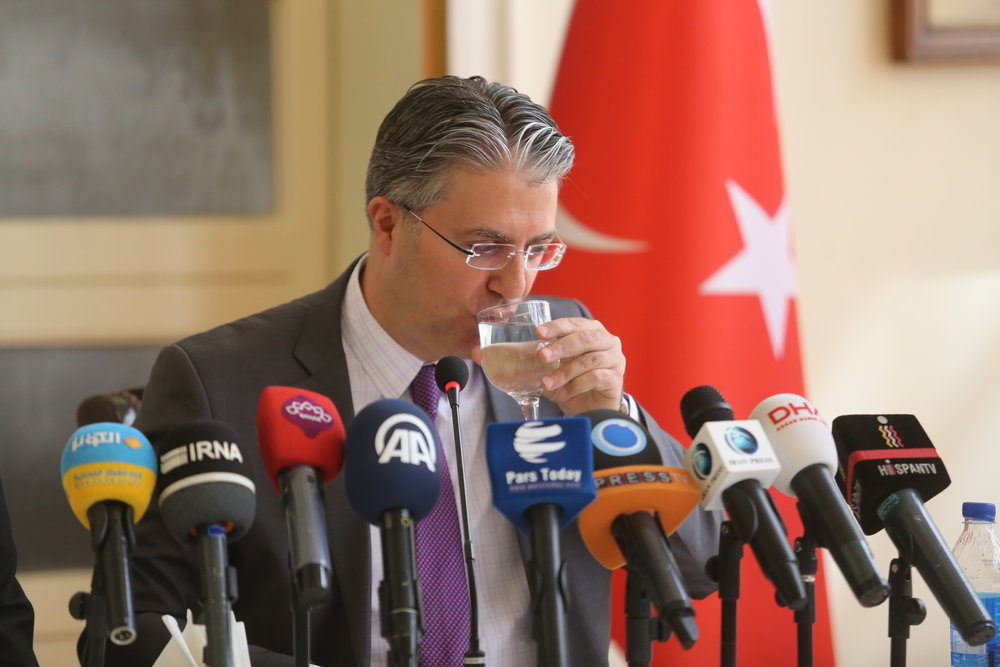Water provides cooperation ground between Tehran, Ankara: envoy

TEHRAN – Ankara’s ambassador to Tehran said on Wednesday that water should be a matter of cooperation not discrepancy between Turkey and Iran provided that it is not addressed “emotionally”.
“As a matter of fact, we consider the water issue as a fertile ground for cooperation not disagreement,” Reza Hakan Tekin said in a press conference held in the Turkish embassy days before the first anniversary of the abortive July 15 coup in Ankara in 2016.
“We hope the Iranian side and media outlets avoid approaching the issue emotionally as it shuts the door to dialogue,” the diplomat added.
From an environmental challenge, water is increasingly turning into a political, existentialist crisis in the Middle East region.
Iran, Iraq and Syria have been long holding Turkey accountable for intensifying water shortages in their homelands, and formation of hotspots and dust storms.
Iraq and Syria rely mostly on the waters of the Euphrates and Tigris for their agriculture. Unsurprisingly, the development of engineering projects on the two rivers, notably large dams and irrigation works, has been a source of growing tension between Iraq and Turkey on one hand and Syria and Turkey on the other.
Although outright violence has been avoided, hostilities have mounted each time that a new dam has been built.
The ambassador denied that his country’s damming projects are to blame for the current dire environmental crises in the region, casting doubt on data put out by neighboring countries.
“We believe this is far away from scientific facts, and the dams built on the Euphrates and Tigris have left not so much serious consequences,” he asserted.
Turkey has built 19 dams on the two rivers and has plans for three more.
Authorities in Tehran, however, offer a different narrative. Ziaeddin Shoaei, head of Iran’s sand and dust storms control body, voiced deep concern over Ankara’s water policies, saying its damming projects give the country an upper hand in case of political rows.
“Turkey can now exercise full control over the Euphrates and 60-percen control over the Tigris in case of political crises,” the ISNA news agency quoted Shoaei as saying on Wednesday.
Speaking at a UN-endorsed conference in Tehran on preventing or minimizing sandstorms running between July 3 to5, Iranian President Hassan Rouhani criticized Turkey’s construction of dams, saying such projects can be “dangerous” for the whole region.
“Many of these sorts of activities should be stopped,” Rouhani said. “Construction of dams without sufficient studies can be dangerous for the future of the region,” he added without elaborating.
Experts have linked sand and dust storms, which repeatedly hit south and southwestern Iran and other regions including capital Tehran, to upstream dam projects.
According to the Turkish envoy, Tehran has not been responsive to an action plan on environmental issues which followed an agreement between presidents of the two countries in April 2015.
“We hope that Iran will reply to our initiative,” the grayish-white envoy stressed.
“Turkey is ready to cooperate with the United Nations or any other international body in this regard,” he added.
In an email interview with The Tehran Times last week, Erik Solheim, executive director of the UN Environment Program (UNEP), saw such disputes “completely normal.”
“First of all I think we should consider these disputes as completely normal. I've hardly ever been in any country in the entire world where there are no disputes among those upstream and downstream. It is not just Tigris and Euphrates; there is Nile and also disputes among the states in India. So this is completely normal simply because you, Turkey and Iraq have different perspectives on Tigris and Euphrates,” said Solheim.
PA/PA

Leave a Comment